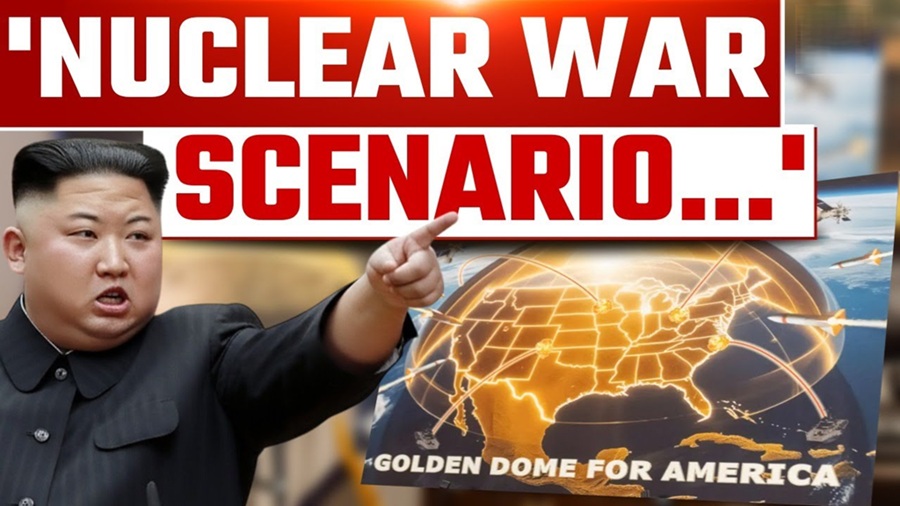In a statement that has reignited global concerns over the militarization of space, North Korea has issued a stark warning against the United States' controversial space defense initiative — colloquially dubbed the "Golden Dome" — championed by President Donald Trump. Pyongyang claims the plan could lead to a "space nuclear war," escalating tensions not just on Earth but above it.
This warning, delivered by North Korea’s Foreign Ministry through state-run media, reflects growing unease in rival nations over what they see as an increasingly aggressive push by the U.S. to militarize space under the guise of national defense. With Trump now in his second term, the ambitious space-based missile defense architecture he introduced during his first presidency continues to shape current U.S. defense policy.
The "Golden Dome" Vision
Originally proposed during Trump’s first term and further advanced during his current presidency, the “Golden Dome” is a space-based missile defense shield designed to intercept enemy intercontinental ballistic missiles (ICBMs) during their boost or midcourse phase. It involves deploying constellations of orbiting satellites equipped with sensors, lasers, or kinetic interceptors that could track and potentially destroy incoming missiles before they re-enter the Earth’s atmosphere.
President Trump has described the project as a "space shield unlike anything the world has seen" and compared it to Ronald Reagan's Strategic Defense Initiative (SDI), often referred to as "Star Wars." He claims it will make America “impregnable” to nuclear threats, particularly from adversaries like North Korea, Iran, China, and Russia.
Although critics called the project technologically ambitious and fiscally impractical, it has received continued funding and support under the U.S. Space Force — another Trump-era creation aimed at securing American dominance in space.
North Korea’s Fiery Response
In its latest statement, North Korea accused the United States of pushing the world toward a new era of nuclear brinkmanship — this time in outer space. “The so-called Golden Dome is not a defense system; it is a weapon of aggression cloaked in the rhetoric of security,” a spokesman from Pyongyang declared.
“Deploying such a system in space threatens global strategic stability, nullifies existing arms control agreements, and opens the door to preemptive nuclear war in space,” the statement continued.
North Korea warned that any such deployment would be treated as a hostile act and that it reserves the right to respond “with force and innovation.” While the statement didn’t specify what measures Pyongyang might take, analysts believe this could mean developing counter-space weapons, including anti-satellite (ASAT) missiles or even orbital platforms of their own.
Escalating the Arms Race in Orbit
The warning from Pyongyang comes amid rising global military interest in space. China and Russia have both invested heavily in anti-satellite capabilities and space surveillance, while India has demonstrated ASAT capability in recent years. The United States remains the dominant space power, but its increasing reliance on satellites for both civilian and military purposes has made it more vulnerable — a fact that has prompted calls for layered defenses in orbit.
Analysts caution that the deployment of space-based weapons — whether for missile defense or offense — could trigger a new arms race. “The fear isn’t just about one nation having the advantage, but about cascading responses from others,” says Dr. Elaine Moore, a space security expert at the Center for Strategic and International Studies. “If the U.S. deploys a Golden Dome, China, Russia, and potentially even regional powers like North Korea or Iran could accelerate their own programs in response.”
Legal and Ethical Concerns
Aside from the strategic implications, the Golden Dome concept also raises significant legal and ethical questions. The 1967 Outer Space Treaty, to which the United States is a signatory, prohibits the placement of nuclear weapons or any other kinds of weapons of mass destruction in orbit. While the treaty does not explicitly ban conventional weapons, many experts argue that weaponizing space violates the spirit of peaceful exploration and cooperation that the treaty intended.
Furthermore, space debris is already a pressing issue. The testing of ASAT weapons, such as Russia’s 2021 destruction of a defunct satellite, has shown how easily space can be polluted with debris, endangering satellites, astronauts, and other space assets. Introducing combat platforms into orbit would only multiply those risks.
The Geopolitical Fallout
North Korea’s statement is not just rhetoric — it’s a signal. Pyongyang is aligning itself with other nations opposed to the U.S. vision of space dominance. Russia and China have consistently called for a legally binding treaty to prevent an arms race in outer space (PAROS), something the U.S. has so far resisted, citing enforcement and verification concerns.
If Washington continues to pursue space-based missile defense, it may find itself diplomatically isolated on yet another front. For allies already uneasy about U.S. intentions in space, the Golden Dome project could become a point of contention rather than cohesion.
Conclusion
The specter of a “space nuclear war” may sound like science fiction, but North Korea’s warning is rooted in real and growing fears about the trajectory of global military strategy. As technologies advance and space becomes increasingly contested, the line between deterrence and provocation blurs.
President Donald Trump’s Golden Dome may still be in its developmental stages, but the ambition it represents — to control the ultimate high ground — is already reshaping international relations. Whether this leads to increased security or catastrophic instability remains to be seen, but one thing is clear: the next frontier of conflict may not be on Earth at all.
